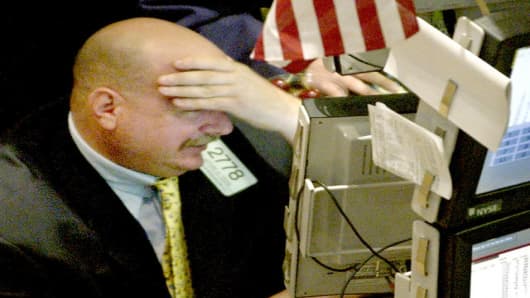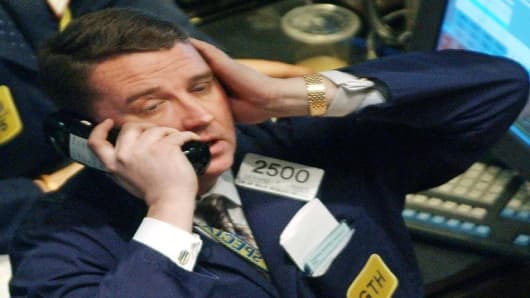Big banks bleeding money. Fighting over the TARP money. Sinking stock market. A Treasury Secretary (or designate) under fire. Economy in decline.
Sound familiar?
What a difference three months doesn't make. Though no one one is saying the financial situation is as dire as late September, Happy New Year has quickly turned into deja vu in the past few days.
"You don’t have one big wave and everything goes back to normal," says independent bank analyst Bert Ely. "A big wave jars a lot of things loose."
If the collapse of Lehman Brothers and other events of last fall constitute a tsunami, the current wave may be scary but not nearly as dangerous, say experts.
There are some similarities in conditions and circumstances, but also some key differences—both good and bad.
For Investors
- Stocks For a Diversified Portfolio
- Hot Tips for Obama's First 100 Days
- Video: Preparing Your Portfolio
- Global Pros: Rate Cuts Have No Impact
- Video: Turmoil in Financials
"It's better in the sense in that we are not facing a freeze up of the financial system, which is why we had to run and pass the TARP," says Dean Baker, co-director for the Center for Economic and Policy Research. "The Libor [problem] is no longer an issue."
"Now we’re having the old fashion recession which is going to create the usual credit problems, "adds Robert Brusca," chief economist at Fact & Opinion Economics. "That's got to create more credit problems and credit losses for banks."
Though much of the current malaise or mayhem—depending on how you look at it—turns on the the deteriorating balance sheets of Citigroupand, to a lesser extent, Bank of America, government crisis management is also a factor.
"It gets back to the problem all along—the constant [policy] zigzagging," says Ely. "We’re continuing to see policy vacillation."
Analysts say there's been plenty of that, lately. A new president—and to a lesser extent—new congress, with a sizable political majority has resulted in a predictable and probably unavoidable loss of traction. Policy differences, high-profile pubic debate and a mini controversy or two, however have also played a negative role.
There's been more resistance than expected—from both republicans and Democrats—to President Obama's massive stimulus package and its likely passage delayed by two or three weeks.
Swift approval of the second round of TARP funding also seemed up in the air at one point because of some differences between Congressional Democrats and Obama, as well as Republicans, even as the President-elect spoke of the need for "potential ammunition."
What's more, Democrats appear wedded to rewriting the emergency legislation, focusing on aid to Main Street, which raised questions about the future role of capital injections into financial institutions.
Enter Fed Chairman Ben Bernanke, who in a major speech say fiscal stimulus alone won't solve the problem and that financial institutions may need more help.
"Bernanke was trying to fight through the fog and say, 'Hey. Don’t forget the banks, their problems are not over," says Brusca.
As is often the case in times of crisis management, Bernanke's move also had unintended consequences.
"It was almost an invitation for them [the banks] to take out their red pencils and go out there with there quarterly results," adds Brusca, referring to the parade of dreadful earnings news Thursday.
"It's just a case of the banks wanting more welfare," says Baker.
Bernanke even revived the idea of buying troubled assets, an idea outgoing Treasury Secretary Henry Paulson had conceived and then abandoned months ago. So did a top FDIC official.
"Try it or quit talking about it," says Ely, the banking analyst, summarizing a common opinion.
The latest policy vacillation comes at a key time, especially with the confirmation hearing of Treasury Secretary designate Timothy Geither delayed to after the Prtesident's inauguration.
Citi is hemorrhaging money, even after two rounds of government funding, while Bank of America is struggling under the weight of its government-aided acquisitions of Merrill Lynch and Countrywide Financial.
Citi's situation of complicated—some would also say clouded—by deepening doubts about the stewardship of CEO Vikram Pandit.
"A lot of the problems with Citi is not moving fast enough," says Ely. "The Citi situation seems to be playing out hour by hour, day by day."
Other say its problems run far wider and deeper and given its large international presence is of critical importance.
"That may help explain why Paulson kept returning to the subject of new TARP funding in the past month and why the Bush and Obama administrations took the extraordinary step of coordinating on the request for the final $350 billion.
Several analysts mentioned the possibility of outright nationalization of Citi, with some even recommending it.
Other banking industry experts say Citi's problems aside, the preoccupation with the health of banks and the situation is over-done.
"Bank lending has not picked up for two principal reasons," says William Isaac, a former chairman of the FDIC. "Banks are fearful of the future and have tightened credit standards. That is what banks always do when entering a downturn."




